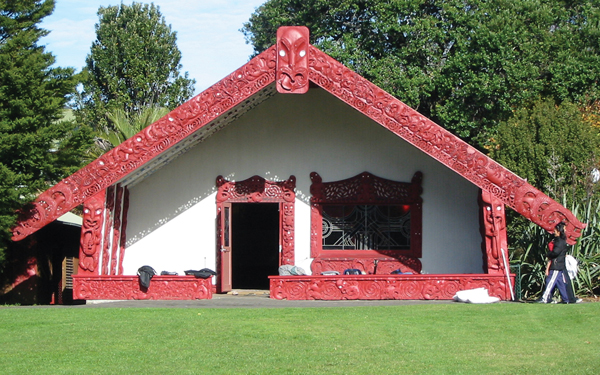|
||||||||||||||||
|
||||||||||||||||
%
responses 2009 ('05) |
||||||||||||||||
y4 |
y8 |
|||||||||||||||
| 1. Where might you see a building like this? | ||||||||||||||||
| on
a marae/ in a Mäori community |
29 (32) | 18 (21) | ||||||||||||||
| mentioned
a specific location |
28 (33) | 54 (50) | ||||||||||||||
| educational
institution (school, university, museum) |
14 (13) | 14 (14) | ||||||||||||||
| If student answers “At Te Papa” or similar, say “Where else might you see a building like this one?” | ||||||||||||||||
| 2. What kinds of things might people do inside this building? | ||||||||||||||||
| discuss
important issues, have hui |
22 (23) | 33 (44) | ||||||||||||||
| socialise/
talk |
10 (9) | 14 (9) | ||||||||||||||
| welcome
visitors/gift giving |
5 (9) | 13 (13) | ||||||||||||||
| cultural
ceremonies (e.g. tangihanga) |
31 (33) | 51 (49) | ||||||||||||||
| teach/learn (e.g. story telling/histories) |
17 (16) | 11 (13) | ||||||||||||||
| sleep
|
21 (17) | 21 (37) | ||||||||||||||
| worship/pay
respect to and acknowledge ancestors |
22 (21) | 23 (16) | ||||||||||||||
| sing/perform | 21 (21) | 13 (15) | ||||||||||||||
| 3. Can you think of anything that you shouldn’t do inside this building? | ||||||||||||||||
| wear
shoes |
14 (18) | 52 (58) | ||||||||||||||
| eat/drink/smoke
|
15 (15) | 21 (23) | ||||||||||||||
| be
disrespectful/muck about/ play around/jump/fight/shout |
68 (69) | 65 (57) | ||||||||||||||
| hang
clothes/belongings on the carvings/pictures |
1 (0) | 1 (1) | ||||||||||||||
| make
a mess |
7 (4) | 4 (4) | ||||||||||||||
| run (i.e. always walk) |
8 (5) | 4 (10) | ||||||||||||||
| walk
over people’s legs/bodies |
1 (0) | 1 (2) | ||||||||||||||
| walk/talk
in front of speaker |
4 (5) | 4 (2) | ||||||||||||||
| sit
on pillows/climb through the window/wear a hat |
3 (2) | 3 (8) | ||||||||||||||
| take photographs | 0 (0) | 0 (4) | ||||||||||||||
| 4. Why are buildings like this one important to many New Zealanders? | ||||||||||||||||
| place where special events take place | 8 (5) | 7 (5) | ||||||||||||||
| unique to Aotearoa/New Zealand; special to Mäori/Mäori tradition/culture | 31 (44) | 59 (51) | ||||||||||||||
| represents the body | 1 (2) | 1 (0) | ||||||||||||||
| represents local Mäori history | 2 (0) | 4 (8) | ||||||||||||||
| türangawaewae (place where one has rights of residence and belonging)/ spiritual place/ancestors | 10 (9) | 25 (29) | ||||||||||||||
Total
score: |
9–25
|
2 (3) | 9 (11) | |||||||||||||
| 7–8
|
13 (11) | 25 (33) | ||||||||||||||
| 5–6 |
24 (32) | 39 (24) | ||||||||||||||
| 3–4
|
38 (39) | 21 (22) | ||||||||||||||
| 0–2 | 23 (15) | 6
(10) |
||||||||||||||
| Subgroup Analysis [Click on charts to enlarge] : |
| Commentary: |
Although
some students at both year levels were successful on this task, overall
performance was not strong. About 60% of year 4
and 70% of year 8 students recognised that a wharenui would be found
on a marae or in a Mäori community, or could name a specific place.
In general, year 8 students had a better understanding of what kinds
of things people might do inside this building. About two thirds of students
at both year levels understood the importance of being respectful within
the building. More year 8 students knew that it was inappropriate to
wear shoes in the wharenui. Just over half of year 8 and about a third
of year 4 students understood the significance of this type of building
for Mäori. Mäori students at both year levels showed a significantly
better understanding than Pakeha or Pasifika students. The 2005 and 2009
results were very similar. |


